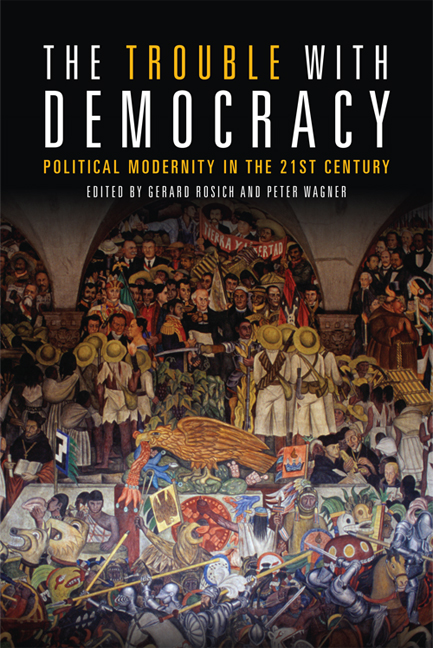Book contents
- Frontmatter
- Contents
- Acknowledgements
- List of Contributors
- 1 Introduction: Re-Interpreting Democracy for Our Time
- 2 Autonomy in and between Polities: Democracy and the Need for Collective Political Selves
- 3 Rethinking ‘Modern’ Democracy: Political Modernity and Constituent Power
- 4 Democratic Surplus and Democracy-in-Failing: On Ancient and Modern Self-Cancellation of Democracy
- 5 Setbacks of Women's Emancipation (Condition, Consequence, Measure and Ruse)
- 6 Political Modernity, Democracy and State–Society Relations in Latin America: A New Socio-Historical Problématique?
- 7 Communitarian Cosmopolitanism: Argentina's Recuperated Factories, Neoliberal Globalisation and Democratic Citizenship. An Arendtian Perspective
- 8 Middle-Classing in Roodepoort: Unexpected Sites of Post-Apartheid ‘Community’
- 9 Democracy and Capitalism in Europe, Brazil and South Africa
- 10 From Realism to Activism: A Critique of Resignation in Political Theory
- 11 The World as We Find It: A Suggestion for a Democratic Theory for Our Times
- 12 Epilogue: Democracy as Capacity for Self-Transformation
- Index
4 - Democratic Surplus and Democracy-in-Failing: On Ancient and Modern Self-Cancellation of Democracy
Published online by Cambridge University Press: 05 September 2016
- Frontmatter
- Contents
- Acknowledgements
- List of Contributors
- 1 Introduction: Re-Interpreting Democracy for Our Time
- 2 Autonomy in and between Polities: Democracy and the Need for Collective Political Selves
- 3 Rethinking ‘Modern’ Democracy: Political Modernity and Constituent Power
- 4 Democratic Surplus and Democracy-in-Failing: On Ancient and Modern Self-Cancellation of Democracy
- 5 Setbacks of Women's Emancipation (Condition, Consequence, Measure and Ruse)
- 6 Political Modernity, Democracy and State–Society Relations in Latin America: A New Socio-Historical Problématique?
- 7 Communitarian Cosmopolitanism: Argentina's Recuperated Factories, Neoliberal Globalisation and Democratic Citizenship. An Arendtian Perspective
- 8 Middle-Classing in Roodepoort: Unexpected Sites of Post-Apartheid ‘Community’
- 9 Democracy and Capitalism in Europe, Brazil and South Africa
- 10 From Realism to Activism: A Critique of Resignation in Political Theory
- 11 The World as We Find It: A Suggestion for a Democratic Theory for Our Times
- 12 Epilogue: Democracy as Capacity for Self-Transformation
- Index
Summary
Democracy contains in itself the seeds of its own destruction. This is a conviction that is widespread in the history of political thought, from its origins in ancient Greece to contemporary political science. True, there are numerous historical examples of the downfall of democracies, and many of the highly varied attempts at conceptualising the reasons for such occurrences contain fruitful insights. However, is it really appropriate to identify the causes for the cancellation of democracy in its ‘self’, its nature? This chapter will argue that it is more useful to underline the possible persistence of a democratic spirit, or culture, even in the face of a cancellation of the institutional underpinnings of democracy. To see democracy as a tragic regime means to recognise the ever-present risk of its cancellation, but it also means to emphasise the anti-democratic nature of such cancellation, thus its incompatibility with democracy.
The following reflections can be read in two different ways, one conceptual and the other historical, and maybe best as a combination of these two. On the one hand, conceptually, this chapter will provide a counterpart to the notion of the democratic paradox, widely evoked recently in politico-philosophical debates about the conceptual origins of liberal democracies. In one version, the notion of paradox refers to two distinct and not consistently connected political traditions at the core of our political self-understandings, namely liberalism and democracy. To use Chantal Mouffe's words:
We are dealing with a new political form of society whose specificity comes from the articulation between two different traditions. On one side we have the liberal tradition constituted by the rule of law, the defence of human rights and the respect of individual liberty; on the other the democratic tradition whose main ideas are those of equality, identity between governing and governed and popular sovereignty. There is no necessary relation between those two distinct traditions but only a contingent historical articulation.
More generally, the paradox refers to the question of the origins of liberal democracy: democracy is the self-government by the people. However, the people as a political collectivity does not exist before its self-government.
- Type
- Chapter
- Information
- The Trouble with DemocracyPolitical Modernity in the 21st Century, pp. 90 - 109Publisher: Edinburgh University PressPrint publication year: 2016

